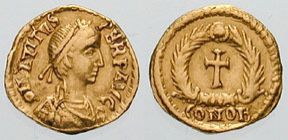Roman Gold Found By Novice Treasure Hunter In Britain

An amateur treasure hunter in Britain stumbled across a find that experts only dream of. The man, whose identity is being kept secret, was using a beginner’s metal detector when he found a cache of Roman coins thought to be worth 100,000 pounds (roughly $160,650).
The man bought a metal detector from a store near in the Berkhamsted, Hertfordshire, area near London and returned a few weeks later with 40 gold coins.
“What do I do with this?” he asked.
David Sewell and Mark Becher, the store’s owners, couldn’t believe it. It was especially shocking because the man only spent 135 pounds on the metal detector.
“It’s a staggering thing,” Sewell told the Daily Mail. “We sold this guy an entry-level machine and he went off and pulled off one of the largest ever hoards of Late Roman gold coins. We believe it’s the second largest.”
The three men got in touch with a local expert and, upon returning to the scene, found 119 more gold pieces that are believed to date back to the fourth century, toward the end of the Roman Empire.
“These are 22-carat gold. They haven’t got any damage and they came out of the ground looking like the day they were made,” Sewell continued. “All I can say is I was there and my heart was going at 10 to the dozen.”
ABC News reported that the haul was found on private land and the lucky treasure hunter could get a share of the proceeds after the local historical society determines the actual value.
The coins – called gold solidi – were reportedly in remarkable condition but appear to have been “disturbed in the last couple hundred years due to quarrying activity or plough action,” said a spokesman for a local museum. Other experts speculated that World War II German bombings could have shifted the position of the coins, which were not found in any jar or container.
“During the period of the Roman occupation of Britain, coins were usually buried for two reasons,” Verulamium Museum curator David Thorold told Hemel Today, a local news organization. “They were buried as a religious sacrifice to the gods, or as a secure store of wealth, with the aim of later recovery. Threat of war or raids might lead to burial in the latter case, as may the prospect of a long journey, or any other risky activity.”
© Copyright IBTimes 2025. All rights reserved.





















